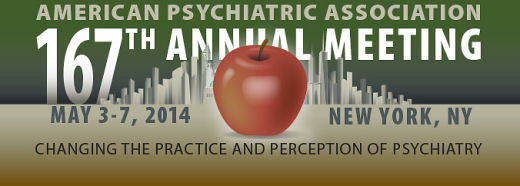I don’t think the APA’s initiative on collaborative care has anything to do with getting other doctors to see psychiatrists as real doctors. Psychiatrists who practice like real doctors are seen as real doctors without PR fluff form the APA. The emphasis on collaborative care by the APA is a function of their political ineffectiveness in supporting the current practice environment and it is also the way oligarchies function. Once managed care friendly contingents get a hold inside of the organization and "cost effectiveness" and "evidence-based" become buzzwords the resulting corporate approach is predictable. If Ioannidis has taught anything – it should be that anyone can come up with the evidence they want and there is ample evidence for that.George Dawson, MD, DFAPA
Regarding the APA’s push for "integrative care" and more specifically about having psychiatrists embedded in internal medicine/primary care practices as the Brave New World. I was chewing the fat with my suite partner in my private practice, who is an excellent psychiatrist doing mainly medication management and consultation for psychologists and social workers. He’s a good guy with 35+ years of experience. After discussing Kupfer’s COI issues and the use of "computerized adaptive testing" for depression and anxiety, he shrugged and offered: "It won’t go anywhere. The Internal Medicine docs hate us" [meaning psychiatrists]. I laughed. APA at work for you! Not!
Just saw this article by Jeffrey Lieberman today on integrated care. Some real gems in there, including this:
There is a historic and exciting opportunity for psychiatrists to influence the future of medical care and occupy our rightful position in the field of medicine."Occupy our rightful position." Doesn’t that smack of insecurity and wanting a more "medical" identity for our profession? What do you think, Dr. Dawson?

If you read this blog much, you will recognize that I have
recycled this image from other posts on Insel’s campaign
for Clinical Neuroscience. It was originally an old Soviet
propaganda poster.
My original specialty was Internal Medicine, something I enjoyed doing, and I think I’ll put on my Internist hat to respond. Dr. Dawson is right on the money here. This is all some kind of garbled system theory talk that reads like a power-point presentation from a Managed Care or governmental think tank meeting where they use the word impact as a verb, where evidence-based and cost-effective are synonyms, and where if there’s a doctor in the room, it’s not a practicing physician.
As an internist, I didn’t hate all psychiatrists, only some psychiatrists. The ones I liked were the ones that did their jobs. They saw the patient, and took care of the problem that I couldn’t handle myself. You could tell that because the patient either disappeared into their care, or when they came back, gave a report like, "We’re working on it." That’s what doctors want from a referral. Internal Medicine really is frequently algorhythmic – psychiatry as I understand it, not so much. The proof is readily apparent in the last twenty years of psychiatry giving the straight medical model the old college try, a bust in my book. Internists, primary care physicians, medical physicians in general spend their life with algorithms and guidelines. If mental illness could be approached that way, back in the day, I would have simply learned the rules just like I learned them for diabetes or heart disease. But I could see that there was something else, and I saw how a decent psychiatrist could approach those patients in a very different way, and do the job I couldn’t do.
I don’t hear any medical physicians, or any psychiatrists, or any psychologists, or any social workers, or any patients clamoring for Collaborative Care. Tom’s partner in the second comment sounds to me like he has a reasonable take on what the internists of the world might say if they read Jeffrey Lieberman’s piece. He’s creating a whole new profession based on the vision from a third party way of thinking about medicine that will surely go absolutely nowhere. So why are he and Dr. Summergrad [new APA president] talking it up so much? As Psycriyic pointed out, that’s what the whole theme of this year’s APA is really all about:


Wow, what timing! I’ve just been working on my own blog post on integrated care. I tried to present a nuanced view, since I’ve had some first-hand experience with one form of it. I don’t think it’s uniformly a bad thing, though I do worry about how it is likely to be implemented.
i don’t like dr lieberman’s view.
it is both boring and seems to strip psychiatry of what i believe makes it unique. it’s almost like he’s saying they should be consultants and “leaders”.
the conclusion makes me want to call him knight lieberman, because no one else could be this excited (and therefore have the energy to champion this boringness) about such a boring role for psychiatrists. he is our saviour! 😛
It was quite full of platitudes, but I think the “silo” metaphor is ripe for the picking.
“Psychiatrists know firsthand this frustration, and that of their patients and their families, with the current models of care and financing: limited payments and visits, with silos between physicians that contribute to fragmented care.”
silos:
1. a structure, typically cylindrical, in which fodder or forage is kept.
2. a pit or underground space for storing grain, green feeds, etc.
3. Military . an underground installation constructed of concrete and steel,
designed to house a ballistic missile and the equipment for firing it.
“The difference between challenge and opportunity is often one of perception. Psychiatrists can view health care reform as leading to an inevitable change from the status quo and worrisome loss of autonomy. Alternatively, they can recognize that psychiatrists are well positioned to participate in and direct new health care initiatives—to become leaders of change, rather than siloed providers outside the mainstream of modern health care.”
Have psychiatrists been prevented from addressing other health care issues with their patients? Or picking up the phone to refer one of their patients to a primary care doctor or specialist? Or recommending to the patient that they see a primary care doctor? Now that more patients will have access to affordable health care plans and can establish a relationship with a GP, isn’t primary care from a psychiatrist redundant? Doesn’t it make more sense to require that mental patients see their primary care doctors at regular intervals to monitor their health and that the GP be able to access the psychiatrists records with the patient’s permission?
Perhaps this perception of being “siloed” needs to be addressed before we move on to something involving a “leap of faith,” entrepreneurship, and the abuse of metaphors before they become “leaders of change.” This is something that could have been interesting and even promising if it had been illustrated with more concrete examples of what he evidently sees as barriers to the care of mental patientsc. His essay reads like a nebulous locker room pep talk about beating “the silos”.
The “new emphasis on early detection and treatment of psychotic disorders” sounds to me like another move in Marketing Based Medicine. Considering the source, I think the suspicion is warranted.
Psycritic,
“Because of the therapist shortage, I often ended up prescribing a medication by default.”
and “In my mind, the biggest unmet need in mental health right now for the insured population is increasing the numbers of providers of effective therapies like CBT, DBT, PCIT, and so on. Of course, the APA does not address this at all. Instead, what the biological psychiatrists tend to emphasize is that primary care doctors don’t diagnose enough, don’t use the right dosage of medication, and patients do not stay on medications for long enough. Thus, the relentless push for diagnostic inflation, mass screening so cases are not missed, medication algorithms so that doses are optimized, and tracking patients like they’re widgets in a factory.”
This is wonderful, sincere, and just what I was thinking. It seems to me, that outside of mental crises, people who think they’re “depressed” of suffering from some sort of pathological anxiety should see social workers first, then a psychologist, then a psychiatrist last. This would allow psychiatrists to work with the most disorganized and debilitated patients and, in time, find treatments that are truly better and less debilitating in themselves.
Marketing has directly and indirectly created the false belief that any failure to be self-same and “productive” is evidence of pathology. People need to learn that suffering is part of life and that life really is very hard sometimes. When professionals in mental health appear to deny this, then it’s time for some speed bumps to slow this process down.
A diagnosis of endogenous brain dysfunction is inherently dis-empowering and should only be given when all other options have been exhausted. Even then, it should not be assumed to be a life sentence with no valid treatment other than medication.
What you propose and the peer-support recovery movement offer humans in distress empathy, fellowship, and hope, which is more powerful than placebo. Though I’ve never denied that psyche meds can be useful (even for myself), I think there’s enough evidence that the overuse of it combined with overdiagnosis does a lot of harm; and as long as that’s not being dealt with head-on by thought leaders in psychiatry, then there is no place for them in leading the charge to change the face of medicine.
Rather than sending everyone to professional mental health care workers to perpetuate their patient-ness, in the US there’s meetup.com where people can find groups pursuing almost every interest, including walking.
Social contact does wonders for those suffering from vague distress.
Someone at MIA linked to this artist’s self-portraits done on different drugs. I thought some here might find it interesting and entertaining.
http://elitedaily.com/envision/artist-creates-self-portraits-on-different-drugs-and-the-results-are-insane-photos/
Psycritic,
Yes, your article addressed my question on the prior thread very well. I liked your nuanced approach because I find it very truthful. Not the whole truth of course, and I am sure you are correct that is probably not how integrated care will be implemented, but it is your part of the truth and I greatly value your insight. I’ve paid tuition and received much less in return than what I get from the medical professionals here for free. It is priceless, and I thank you all very much.
My last thoughts after reading more of Dr. Lieberman’s quotes are, I’m convinced that integrated care is already a done deal; it is just a matter of time before it rolls out across the country. However, I am undecided if the APA leadership is reading the hand-writing on the wall and reacting to it or if they are already positioned in it and are trying to sell it to their membership, and peripherally the public, with the real sell to us coming from the media.
That’s true, too, Altostrata.
https://www.youtube.com/watch?v=et1xzavRVOw
This is sickening:
https://www.youtube.com/watch?v=et1xzavRVOw
Go to about 1 minute and listen to his predictions on all the cost savings from ACA. And he never mentions that half of psychiatrists don’t even take insurance.
He’s clearly starstruck by Obama and that is blinding his judgment. I don’t think it’s an admirable quality that a middle aged adult in a position of responsibility is this naive. But then I’m one of those quaint relics that looks at results rather than idealistic talk and intentions.
But let’s all pretend that Lucy won’t pull away the football just this once…